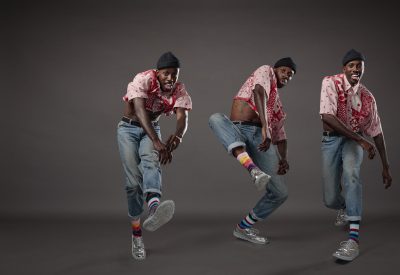In The Trust Of Brothers
Earlier this year, the self-proclaimed New Kings of the Underground return with their sophomore album Vacation in Hell. When I think about Greatness in music, what it takes for an artist to make their everlasting mark on the culture—Kendrick, Jay Z, Trina, Missy Elliot—each of these titans, and many more, are diligent students as well as diligent artists. It is artists who study the long arc of history that will carve a space for themselves within it. I see this for Flatbush Zombies, now more than ever in the wake of this new album. In notable tracks like “Headstone”, a song in which the students become the masters, the track proves itself to be an amalgamation of their teachers. From Jimi Hendrix to Kurt Cobain to Keith Haring, Flatbush Zombies open up the possibility of their artistry by not limiting the scope of their potential and it is the most evident in this new collection.
Even more importantly, they are each other’s inspiration to rise. In a world of chaos and uncertainty, Meech, Erick, and Juice keep each other alive. As though life itself through the lens of this album is a Divine Comedy, what feels like a daring adventure out of hell and towards some iteration of heaven is the story of three men and the unyielding power of brotherhood. They are able to find solace, salute the dead, and celebrate life because they have each other. I was granted the chance to speak to the group about the inner world of their album.
I.S. Jones: On the cover of Vacation In Hell it’s the three of you sandwiched between two women covered in glitter. It looks like the still from the music video “Vacation” with Joey Badass. What is the functional purpose of having the women covered in glitter as it relates to ‘vacation’?
Erick: First thing is we really love Jimi Hendrix. Hendrix had a very similar shoot with two women & we were trying to pay homage to him. We wanted our version of the picture he took. I think we have that down before we even had the title for the album.
Meech: I think it was the opposite, the video came after. The video was an afterthought, we just wanted to see the album in motion. The purpose of the cover wasn’t necessarily to “put a woman on it” because it’s vacation, but I just wanted to pay homage to Hendrix. The women [on his covers] are very natural with hair all over their bodies and it’s a very different era.
We wanted to create a different version of that, but you can’t really put those kinds of things on a cover. We had to find another way to show the beauty of a woman’s body without it coming off as misogynistic.
In that same music video, one of the more powerful visuals is the use of the ad-libs. They either complement or negate the lyrics. The ad-libs are doing work in the foreground & you have the lyrics working in the background & there is this duality afoot. What is the purpose of language being in conflict with one another or complimenting each other along with the visuals?
Meech: I don’t know. A lot of times people make that kind of commentary on their own. People don’t know what’s real, so with the boat, they make smart comments about it. It was a way to make things not so plain, so we have captions that people can comment on. You can comment on one caption or all of them. We wanted to do something to shake things up even if it went over people’s heads.
One of the more notable songs on the album “Headstone”, you all break it down for Genius, talking about how the song is a “lyric exercise.” How does looking back to the past and paying homage allow you to navigate “hell” on the album?
Erick: All three of us are inspired by the people who came before us. Whether it was hip-hop, R&B, rock, or reggae, it all contributed to who we’ve become as artists. A song like [“Headstone”] is proof that we actually live the music.
In today’s market, people act as though they are the originators of everything they do. We’re the opposite. We’ll tell you exactly where we pulled our inspiration from because no idea is original; and we would rather give that credit to the person who inspired us—Kurt Cobain or Jay Z; Keith Haring or Annie Lebowitz. This song is touching on people who laid the foundation for us.


Jones: In “Reel Girls,” Meech, you say, “Reel girls get down on the floor / Zombie Gang baby, act like you know / Championship ring on her toes”, is this a reference to David Banner’s “Life Like a Pimp: “Real thugs get down on the floor / Real girls get down on the floor / Like a Pimp”
Meech: It’s more of a reference to Pimp C; that’s why we have Bun B on the song. We were blessed enough to make music with him while he’s still around, so it was a way to pay homage to UGK. Erick had a conversation with Bun and Bun said a lot of affirming things about the group and our sound, but Erick could tell that story better.
Erick: Our dream was to the get Bun B on the song. We met him one time before, but we really didn’t have a musical relationship with him. It was kind of a shot in the dark. We reached out and he was very responsive.
Before he recorded his verse, he called to talk to me about coming up in the game with DJ Screw. He schooled me to some of the things he was facing, especially being different. Even though [UGK] were a duo, they experienced a lot of the same things we experience: People trying to make us an outcast, making it seem like we don’t belong because we’re different. He told me that we should stay true to who we are and that’s what he wanted to do the record.
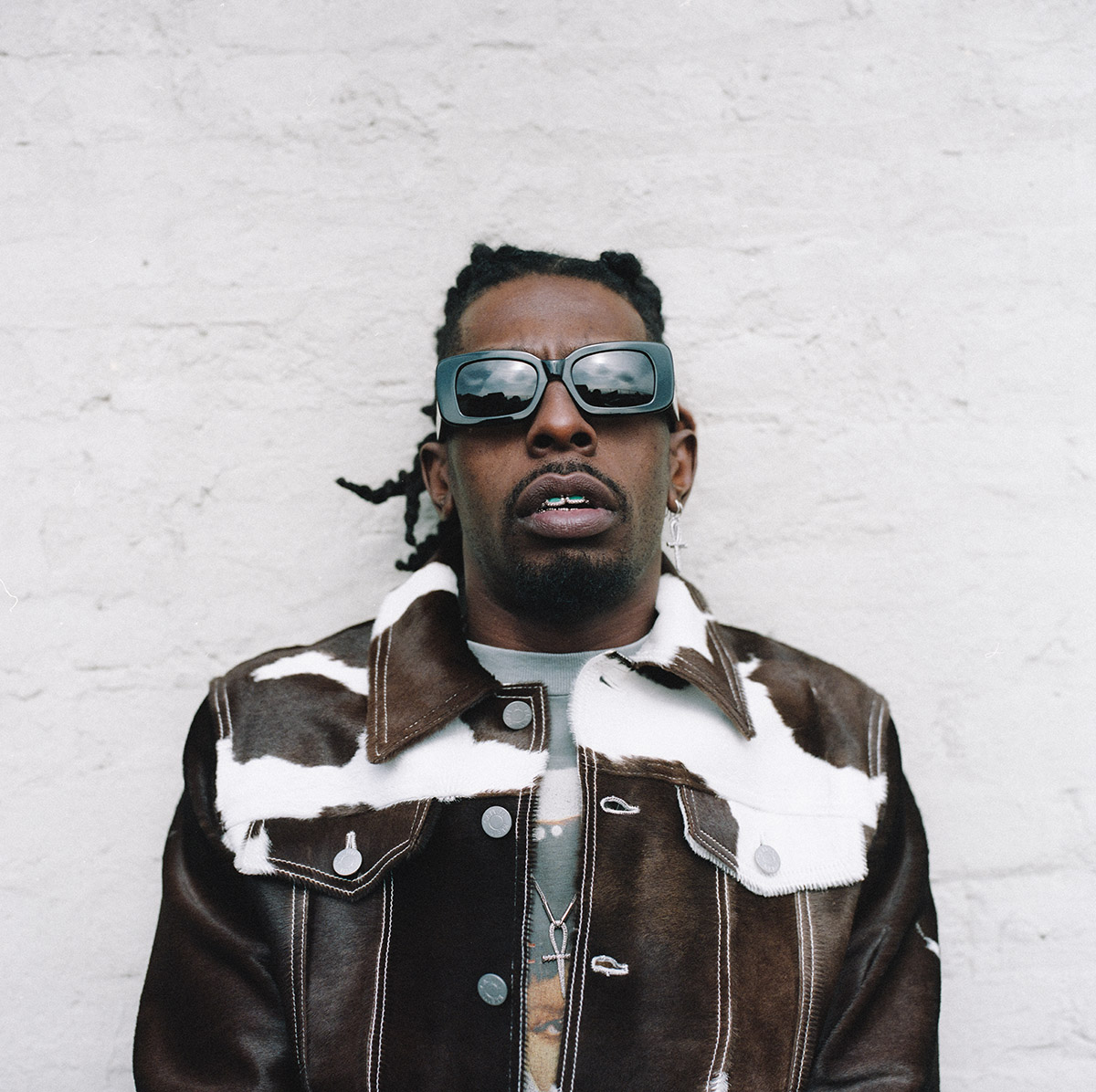

That’s beautiful. That must have been a really wonderful compliment to get from someone who you admire so much.
Erick: Also, the UGK song that David Banner sampled is called “Take It Off.” I want more people to listen to that kind of shit. “Take It Off” is one of my favorite songs.
What’s something other interviewers, or even fans, often get wrong about Flatbush Zombies?
Juice: That we’re always high or on drugs.
Meech: Yeah, man. It’s one thing that always gets me so tight. A guy sat down and ate with us for an hour, and was asking me questions that I already answered in the album. If I made a song called “Reasons Why I Love Erick & Juice,” an interviewer will ask, “So why do love Erick & Juice so much?” Instead of asking more in-depth, clever questions, we get the same kinds of questions over and over. Another thing people get wrong is understanding how authentic we are. It’s been 8 years now. There are no gimmicks here.
Erick: I think from a production standpoint, I’m kind of tired of people comparing projects. It’s okay to have a preference, but to recognize that all the work is actually good music is the biggest thing that we’ve been talking about.
Many artists, especially independent ones, can’t afford to clear or get in contact with the artists they’re sampling. [People wanna say] “You should look at music as something more original.” People think sampling is living in the past, but it’s such a core of hip-hop.
Meech: People don’t realize they like that shit because it’s who they were when it came out. I liked The Marshall Mathers LP back then because at the same I was “this” age and it did something for me. I’m not gonna ask Eminem to do that again. He’s older. I’m older. If you stay the same person then you need to stop and reevaluate your life.

During the production of the album, was there any kind of professional relationship you fostered that helped you mature in your sound? Relationships that helped you grow?
Erick: This is the first time we recorded an album in a studio. Up until now, we used home studios. Most of the production is still done by me, but this time I had a producer/engineer by the name of Tyler Dopps we worked with. He played a pivotal part in helping lay the tracks out & arranging them. I didn’t know I would need Pro Tools before we started making this album and I had to get with it in order to make this album what it is.
One of my favorite songs on the album is “Crown” and Erick your verse begins: “Bleedin’ through people to see the stars / I’m needed in cities large / Look down, tote out, break down these walls / A stupid man could evolve / losers told me I wouldn’t be on the Earth for this long / My resurgence was strong, what do I do this for? / Gotta relieve, gotta release, everything beautiful.”
As we near the middle of the album, where we lean towards the ‘heaven’ aspect of the album, it seems as though you are grateful for your growth as an artist and as a person, but also for your success as a collective. Did you go through many drafts before you landed on those lyrics?
Erick: When I said, “A stupid man could evolve,” I believe we’re given all the ability to change and grow and even if people have a perception of you, it’s your responsibility to change it. That perception is created by your existence, but all you can do is be yourself. If you’re aware of it, that’s your first step in beginning to change it. So that’s why I then said, “Breaking down the walls”, changing the boundaries that effect against us, whether they’re good or bad.

Meech in the same song, you rap: “No one gets out alive / So we livin’ like we already died / No one will ever understand but the sky”. In the past, you said something to the effect of having a new conscious, a new mental state with the death of your ego by way of reincarnation. How does you escape hell when it’s an internal turmoil?
Meech: As far as “No one gets out alive”: from the moment you’re born, [you’re fighting to stay alive]. We have yet to see someone who cheated the game of life. Show me that person. The only way, [I feel] we can live forever is through art. “So we livin’ like we already died’: we continue to smoke and eat bad food and live negatively; that line was a reflection of those things. We all have our vices in life that’s really killing us. We’re all doing something that’s not helping our bodies or souls or our minds. I’m still trying to figure out [how to escape hell] myself. But when I do, I’ll free everybody.
One of the greatest strengths of the album is that there’s a lot of maturity, in terms of lyrics and sounds. Between your initial album to now, it’s very apparent that you guys know what you want for yourselves. The sounds are much more crisp, much more dynamic. Beautiful, too. You have so many soft moments, and I love the moments of brotherly love which I felt it was time we witnessed this side of you.
Meech: Thank you for saying that, really. Especially the part about brotherly love. When people tell me they heard the album, one thing that really makes it worth it is when people say they can hear our brotherhood. No matter what happens if I were to pass right now, does the album really tell how we felt when we were first starting out?


Between “Proxy” and “U&I” is really where we see a tonal shift and we’re gradually lifted into it, but the track listing makes sense for what the sound is trying to do.
Meech, I wanted to talk to you a little bit more about “YouAreMySunshine”. What was it like writing that song and paying homage to a dear friend that you lost? Did you find yourself becoming more vulnerable?
Meech: I’ll address the vulnerability first. We’re like poets, anything that’s going on in our lives. We’re gonna write about it. So that shit with Yams naturally happened. The lyrics I originally wrote had those verses and there was also a verse for Steez as well. My original verse was supposed to be tribute to the both of them. I was just writing how I felt. One time, my friend and I were in Croatia, and I just wrote.
When I tried to record it, Erick has this beautiful choir and crazy production. Honestly, it was the hardest thing I ever had to record, as far as breathing was concerned and keeping it all together. After it was recorded, I tried to revisit it and it just didn’t feel organic when I tried to redo it. We decided to keep in the first take where I cried. So that’s a real first-take for the track.
It’s an honest track. The emotions displayed here are real and I believe your grief.
Well, it’s all true, so I’m glad someone believes me and I feel it’s our job to talk about these sorts of things so when other people listen to our music, they’re not afraid to say how they feel. Everyone has a friend that they’ve lost. I had happened to have a friend whose death affected a lot of us.

The song’s also a testament to how much you trust your fans. There’s a lot of personal growth, but there’s also this trust you have in us to carry your message.
Meech: Hell yeah, and I don’t think many people have those kinds of fans that they can trust. I think we have that kind of relationship where we can trust them and they trust us. They know Erick will never take a shortcut and they know we’re honest in our music.
With regards to the tracklist ordering, why does “U&I” begin the lean towards heaven and not “YouAreMySunshine” or perhaps, “Best American”; two songs which are much more dramatic in terms of emotions?
Erick: In the process of arranging this album, we had 19 songs. I think what I was going for was something really dramatic. Diamanté, who sang on the song, when we originally made the song, it didn’t have an intro and the part she added really changed the feeling of the song for the better. I felt like when we were doing our set, I feel I was right about where it was placed because once you hear her voice, people know they’re expecting a change. She actually wanted it to remind the audience of Aaliyah.
When we first recorded it, I used a lot of instruments to manipulate her voice, and she said it took away from her feeling like Aaliyah. When Aaliyah sang, “Let me know, let me know”, that’s what she was going for. We made it more minimal. I feel like when people hear the project, they know changing is going to come. And the songs that follow after, “The Goddess,” “Trapped,” and “Best American,” “Misunderstood”, “YouAreMySunshine”, “The Glory” those are the songs that I wish they had more meaning in the first half but they take a couple of listens to really digest all the stuff that’s being said. I feel there’s a lot more weight. It’s more, like you said, whether you look at the first half being Heaven or Hell. They’re definitely split at that point depending on which side you find yourself on.

How is the tour going? Are you guys having fun? Do you have a favorite city that you played already?
Meech: I’ll go and say it: in the Denver show, people were having sex in the crowd. I have a video on my phone. I know it sounds creepy, but it was sent to me because I didn’t believe it. And yeah, they were doing it. We’ve been touring for 7 years and I’ve never seen that, so that must mean it’s lit for people to be fucking in the crowd. Someone was on vacation.
Anything else you boys want to add?
Juice: Download “Vacation In Hell” on all streaming platforms. Keep supporting independent artists. Support all artistry, but know independent is the way to go.
You might also like 


















